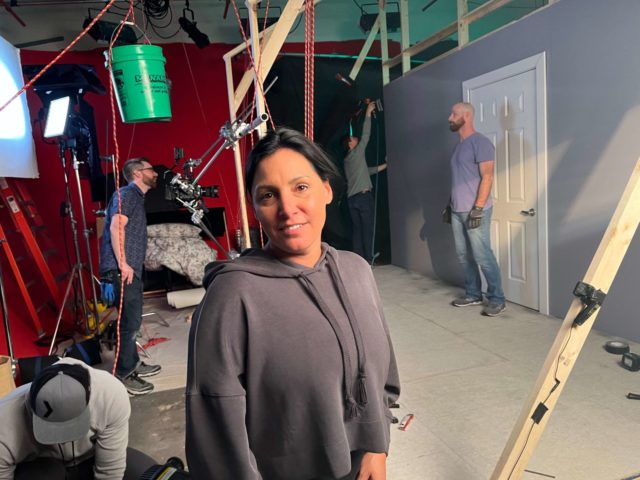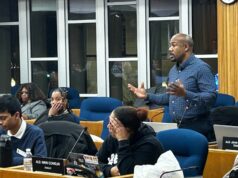Singer/songwriter Kelly Jackson just wanted to make some music for her children.
In 2012, she recorded Spirit of a Woman, an album that was “really a tribute to all the women in my life that have, you know, impacted who I am and who I’ve become,” she said in an interview last week. “It was more of an uplifting album and more acoustic but it’s all influenced with Native American music. And that album was really just a legacy piece. I wanted something to share with my children and maybe my grandchildren. I never really thought it was going to be shared with anyone.”
But shared it was — enough to earn a Native American Music Award and nominations for several others. Jackson thought maybe she was onto something and in 2015 put out a second album, Renditions of the Soul.
“My sophomore album touches on some of the topics that are a little harder to deal with things like addiction, sexual and physical violence, just sort of the trauma of life in general,” she said. “Music is medicine. It’s really part of the healing process.”
One of the tracks on that album, Don’t Speak, draws from her own experience as a survivor of domestic violence.
“The song is called Don’t Speak, which really is the reality of how a woman in many cases deals with trauma,” she said. “It’s just not talked about. People don’t want to talk about it, it makes people uncomfortable. And I think we should be uncomfortable about this, we should be very uncomfortable.”
Jackson, a member of the Lac du Flambeau Band of Lake Superior Chippewa, has been in a Madison studio this week filming a video to accompany that song with hopes to raise awareness of the ongoing issue of Missing and Murdered Indigenous Women, and hopes to leverage it to raise funds to support survivors and create change.
“Missing and Murdered Indigenous Women is an epidemic. It’s tragic. We want to raise awareness in general, and I thought through music and the interpretation of this music video, hopefully we’ll be able to generate some more interest,” she said.
The video uses a cast of Indigenous volunteers in a variety of situations where violence can happen — in the military, in the home, among children. Each of the four scenes is literally turned upside down — using a hidden system of ropes and pullies — to depict what happens to lives in those situations.
Jackson’s organization, Spirit of an Ikwe, is funding the production, with a bit of help from Perodigm Media, an Indigenous-owned production company.
“They came and helped create the concepts and build the amazing set, along with their staff being incredibly dedicated to making this happen. And I will say that they are probably putting a lot more into this project than what I’ve given,” she said.
“It just seemed to be a good collaboration with the depth of resources and network that we had already in this nonprofit advocacy work,” said Perodigm owner Rob Pero. “And what she was kind of bringing to the table, it just seemed like a really good opportunity to work together and to amplify both of our initiatives.”
Jackson said the video comes from conversations among Indigenous women and advocates.
“We held quite a few focus groups. The first was just sort of a brainstorming with a few of my personal friends, and we really kind of dove into, ‘what is the story?’” she said. “We really haven’t figured out what’s the way we want to make the biggest impact. How do you solve this problem? We want to talk about not just providing services to survivors, but to also protect our women and girls. We want to really have an impact … I’m just looking for advice on how can I take this story that’s really passionate for me and my own experience from being a victim of violence … how can I do something more than just write and share music? I’m asking the community, what more can I do? Because I would really love to be part of that solution.”
Pero said this project is part of a trend of more Indigenous voices being amplified and heard over the past several years.
“I think DAPL was a big deal,” Pero said, referring to the Dakota Access Pipeline protests. “And I think people realized that everyone could be their own form of media and their own news outlet when they went live. When people went live from DAPL, that was a big deal for indigenous people because we were finally heard across boundaries, outside of the reservation. We were heard on a national stage. I think we actually saw things happen. That was sort of the origin of this movement of not only hearing our voice, but being the ones that are initiating that storytelling. So you’re seeing more indigenous-led PR, you’re seeing more indigenous-led media, you’re seeing (the TV series) Reservation Dogs and (in the) mainstream we’re really starting to show our culture. We want to be able to tell our story of trauma and perseverance and the fact that we’re sustainable people, but we also want to show our personality, our humor and that we are inclusive and we want to share our cultural knowledge. I think you’re just seeing a shift overall, because now we’re kind of taking that mic back.”
The new “Don’t Speak” video will debut at an event Sunday, May 15, at Comfort Inn and Suites in Cottage Grove, with Lac du Flambeau president Shannon Holsey and other dignitaries on hand.


































